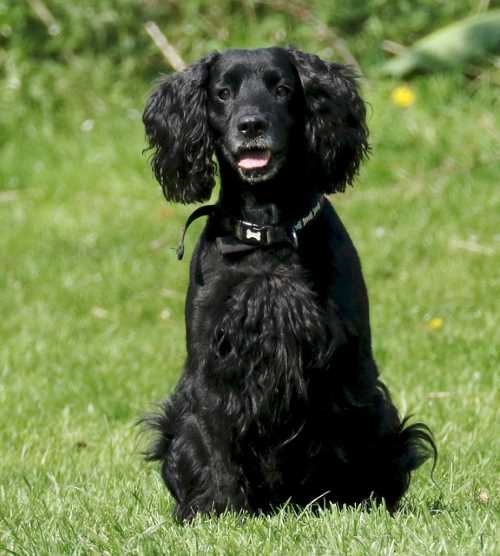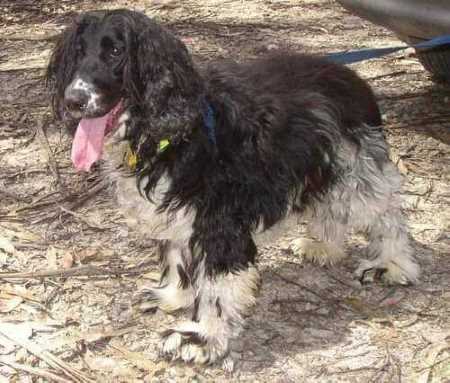- Home
- Cocker Spaniel Health Issues
- What is kennel cough?
Kennel Cough Explained
Prevention, Symptoms and Treatment
Kennel cough often sounds worse than it actually is. It doesn't always need treatment as it will go away on its own, but it's always best to understand the causes and symptoms, and what treatments you could give your dog to help ease his symptoms.
What Is Kennel Cough?
The medical name for kennel cough (KC) is Infectious Tracheobronchitis or ITB for short, also known as 'canine cough'.
It's a respiratory infection of the trachea (throat), larynx (voice box) and bronchi (root-like passageways through which air passes into and out of the lungs).
The kennel cough virus is a respiratory disease caused by the bacterium Bordetella bronchiseptica and can affect dogs and cats.
The infection causes irritation and inflammation of the larynx and trachea, which makes your dog cough so much.
And when I say cough, I mean COUGH! This is the mother of all coughs, which doesn't seem to let up!
 Hello Mum!
Hello Mum!It's dry and hacking, and you'd be forgiven for thinking your dog was choking. But don't worry, it often sounds much worse than it is, and your dog is unlikely to feel ill; just keep an eye on him.
Kennel cough is spread through direct contact between dogs and their owners. It has a two-week incubation period and usually occurs during cold weather months, especially from December to March.
Although there isn't really a cure for kennel cough, it's generally nothing to worry about as it tends to sort itself.
There is a vaccine, and you must ensure your dog is vaccinated before your Cocker can stay in the kennels.
As a word of caution, there may be occasional complications which can affect the lungs and sometimes result in pneumonia, but this is rare.
What Are The Symptoms Of Canine Kennel Cough?
Kennel cough symptoms typically include a constant, dry, hacking cough which can sound like goose-honking. The honking cough is often followed by gagging or retching, and some owners have likened it to whooping cough.
The persistent cough may disrupt your household because it will continue during the night.
Max had kennel cough a few years back, and I can still remember those sleepless nights, so be prepared!
If left untreated, it can cause pneumonia or, in severe cases, death.
If your Cocker is lucky, he'll remain healthy, be (almost) his usual self, and will only have to suffer the cough, which is bad enough.
However, other Kennel cough symptoms, which are milder, may be:
- sneezing or snorting,
- a runny nose,
- watery eyes,
- mucus,
- coughing up white foam,
- fever.
If your Cocker Spaniel loses his appetite, becomes lethargic, develops a fever or appears less alert, you should take him to his vet as soon as possible because he may have additional problems or complications.
 I'm watching you!
I'm watching you!Kennel Cough Treatment
Although there is no treatment as in cure for kennel cough, you can treat the symptoms and make your pet feel more comfortable.
Seeing your faithful friend suffering from the symptoms of this condition is heart breaking, but you don't need to worry.
Nor do you need to feel helpless because there are several things you can do to help him recover quickly and comfortably.
Keeping your Cocker Spaniel warm, dry and comfortable, and giving him lots of TLC, can help to minimize your pet's symptoms and make him feel better.
You could also try one or more of the following:
Prescription Anti-Inflammatories
If your Cocker struggles to breathe, your vet may suggest using an anti-inflammatory to reduce inflammation and help soothe his airways.
Doggy Cough Mixture
You have one or two options here.
You can ask your vet for something to help soothe his cough, buy one over the counter, or try a homemade remedy such as honey and lemon mixed with a few drops of water.
It's best not to give your pet human cough medicines unless it's a homoeopathic remedy and your vet has given it the all-clear.
 Kennel cough often sounds worse than it is.
Kennel cough often sounds worse than it is.Kennel Cough Antibiotics
Antibiotics are often prescribed for infections caused by the Bordetella bacteria. Some vets will give it out automatically; others prefer to keep antibiotics for more severe illnesses.
I prefer to use a combination of tender loving care and home remedies.
The good news is that you may not need to give your dog any medication because kennel cough usually rights itself in a few days.
Home Remedies For Kennel Cough
If your dog's symptoms are mild, there are a couple of home remedies you can use to treat canine kennel cough to help give him much-needed relief.
Remove His Collar and Use a Harness
A collar will be out of the question if your dog pulls on his lead (and many Cockers do!).
While your dog has this cough, it may irritate his throat and cause him to cough more, so the easy thing to do is to remove it!
I recommend you fit him with a harness when you take him for his daily walks, but remember to attach his name tag to it, just in case!
A Clean Stress-Free Environment
Keep your Cocker's environment calm, clean and stress-free, for example:
- Try not to get him over-excited, as it can make his coughing worse;
- If he's due for a visit to the groomer (and it usually stresses him), put it off until he's better;
- Cigarette or pipe smoke can often make matters worse, so if you smoke, perhaps it would be a good idea if your pet was kept in a smoke-free zone until he's fully recovered;
- Now might be a good time to give his bedding, blankets, toys, food and water bowls a spring clean to keep bacteria at bay.
All of the above will go a long way to helping your little boy to stay relaxed and calm and allow him to feel a lot better.
Extra Vitamins and Hydration
Additional vitamins C and E may help provide support for his immune system. Check the dosage with your vet and ensure your dog drinks plenty of water.
Soften His Food
No matter how small, kibble can be painful to an inflamed throat as it's swallowed.
Consider changing it to a wet food until your dog is better, but please be aware that any sudden change in diet may cause an upset stomach and/or diarrhoea.
A brilliant suggestion from my vet was to soften Max's Kibble with hot water 5 or 10 minutes before I fed him.
This worked a treat as it took all those little rough edges off his kibble (so as not to irritate his throat) and seemed to go down a lot better.
Homeopathic Remedies for Kennel Cough
You may find the following useful if you prefer your kennel cough home remedy to be homoeopathic.
It's said that the 'tea' from a natural liquorice root soaked in boiling water can help soothe a sore throat.
If your dog refuses to drink the tea from the bowl, try adding it to his next meal.
Honey and lemon can also help to soothe a sore throat. How often have we taken it ourselves, or given it to our children, when we've had a cold?
Beg, borrow or steal a humidifier and keep it in one room to help your dog breathe better. You could add a drop or two of essential oils, such as eucalyptus or tea tree.
A few drops of essential oils (such as lavender, tea tree, or eucalyptus) in a humidifier or a burner will give off a gentle vapour.
These oils are antiviral and antibacterial and will help soothe your pet's breathing and smell nice too!
If you don't have a humidifier, the next best thing would be to allow him into the bathroom while the family showers. The steam will help to loosen and unclog his airways.
This last one is my favourite home remedy for kennel cough!
 Hi Mum, my cough is much better now!
Hi Mum, my cough is much better now!Kennel Cough Vaccine
The vaccine is a preventative measure, not a treatment.
It can be injected, sprayed directly into the nose, or given orally. It's not fool proof, but it will protect your pet against many viruses and bacteria.
My vet recommends a kennel cough vaccine once yearly (using a nasal spray). However, if we were planning to put Max into kennels 2, 3 or even 4 weeks before his next vaccine was due, we'd bring his renewal date forward.
Some vets recommend giving the vaccine every 6 months.
Others believe in providing the vaccine 5 or 6 days before your pet is due to go into kennels.
I recommend you take advice from your vet as he knows your dog best.
Possible Side Effects of Kennel Cough Vaccines
It's helpful to understand that the KC vaccine may have some side effects.
Mild reactions (such as a small lump or swelling where the needle entered the skin, loss of appetite, and lethargy) are harmless, but I am concerned about vomiting and diarrhoea, for example.
It's always better to know what you're dealing with so ask your vet what side effects you should look out for and be concerned about if any.
Want To Learn More About Kennel Cough?
What Causes Canine kennel Cough?
There are many causes of this highly infectious bronchitis.
As it's airborne, kennel cough is usually contracted by inhaling a virus, such as a parainfluenza or an adenovirus virus.
It can also be caused by a bacterial infection, the most common being Bordetella Bronchiseptica.
If your dog is mixing with many other dogs in the park (as they do!) or whilst in kennels, the infection can spread like wildfire!
This is why kennels require your dog to have an up-to-date kennel cough vaccine if he's to stay there.
Other causes are:
- crowded places, such as kennels,
- warm, damp air and a lack of (or poor) ventilation,
- stressful situations,
- exposure to high levels of dust,
- cigarette or wood smoke,
- cold temperatures.
Is Kennel Cough Contagious?
Yes, it's highly infectious. Kennel cough viruses are usually picked up where other dogs gather, such as boarding kennels and the local dog park.
Your vet's surgery isn't immune, either!
The Bordetella bacteria can remain in your dog's system for up to 3 months, which means that he may still be infectious during that time.
If your Cocker Spaniel is unlucky enough to get kennel cough, it's best to keep him away from other dogs, so no visits to the doggie park.
If you have more than one pet, it may be too late to stop them from getting it; in fact, you may be seeing some of the symptoms already!
If other pets in your household don't show any visible signs of canine cough, I recommend keeping them apart.
Feed them separately (use different food and water bowls) and give them separate sleeping areas and bedding.
Unfortunately, you'll also need to walk them separately too.
How Long Does Kennel Cough Last?
Canine kennel cough may develop within 2 and 10 days after exposure.
It typically lasts for a couple of weeks if it's uncomplicated. However, it can hang around for longer (between 2 to 4 weeks) if more than one virus and/or bacteria are the cause or if complications occur.
Recovery may take a little longer if your Cocker Spaniel;
- is run down,
- has a weakened immune system,
- has a medical condition,
- is a young puppy or an older dog.
Pregnant bitches may also take longer to recover for obvious reasons.
What About Kennel Cough in Puppies?
If you suspect your puppy has kennel cough, keep a close eye on him.
Watch his temperature and make sure he eats. If he becomes feverish or lethargic and refuses to eat, take him to see his vet immediately.
If he just has the hacking cough but otherwise seems okay, it's not necessary, but it won't hurt for him to see his vet anyway.
Puppies can often take longer to recover from canine cough because their little bodies are still developing, and their immune systems aren't yet up to speed.
Can People Catch It?
Although there is minimal risk, there is speculation that because Bordetella Bronchiseptica is similar to the bacteria that causes whooping cough, it could become infectious to people.
However, my research showed that kennel cough-like symptoms appeared only in people whose health wasn't good or whose immune system wasn't up to par. In both cases, it was scarce.
In general, though, the answer to the above question is no, you've nothing to worry about.
Kennel Cough: Summary
In many respects, KC is a bit like the common cold; little Jimmy goes to school with a runny nose and a tickly cough, and within hours he's passed it on to most of his classmates!
And, just like the common cold, it can clear itself within a few days without complications.
Although there isn't a sure-fire cure for Kennel Cough, you can help to avoid it in the first place with a yearly vaccine.
 What's kennel cough, Mum?
What's kennel cough, Mum?The best thing you can do to make your Cocker Spaniel's life a little more comfortable is as follows:
- Keep him warm and calm;
- feed him well and make sure he drinks plenty of water;
- give him a little honey and lemon to help soothe his cough;
- soften his kibble with hot water to help make it easier to eat;
- remove his collar and use a harness so that 'walkies' are still possible without causing a massive coughing fit.
- turn on the shower, close the bathroom door, sit with him, and just let him breathe in the steam.
Give him lots of TLC, and Mother Nature will do the rest!
If you don't see an improvement in your dog within a couple of weeks or his health declines, take him to see his vet just to be on the safe side.
Photo Credits: What is Kennel Cough?
1. Copyright of About Cocker Spaniels
2. Dominic Morel - https://www.freeimages.com/photo/in-the-dog-box-1383457
3. Woodypino at https://pixabay.com/photos/cocker-spaniel-dog-cocker-spaniel-1744063/
4. Jennie Robinson Faber at https://flickr.com/photos/jenniewoo/300079
5. Jane Halper - https://www.freeimages.com/photo/bright-eyes-1482945


